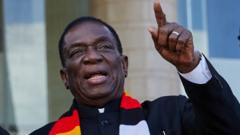The recent appointment reflects ongoing tensions and changing dynamics within the military and political landscape of Zimbabwe.
**Zimbabwe's Leadership Shake-up: New Army Chief Amidst Protests**

**Zimbabwe's Leadership Shake-up: New Army Chief Amidst Protests**
Zimbabwe's President Emmerson Mnangagwa appoints new army chief ahead of looming protests demanding his resignation.
Zimbabwean President Emmerson Mnangagwa has made a significant change in the military leadership by appointing Emmanuel Matatu as the new army chief, just days before scheduled protests led by war veterans calling for his resignation. Matatu, previously a major general and a notable figure in Zimbabwe's liberation war, assumes command effective immediately amidst increasing scrutiny and discontent over Mnangagwa's governance.
The protests, set for Monday, have been organized by a faction of former war veterans unhappy with the president, who took power through a coup in 2017 and is accused of corruption and mismanagement by some of his former allies. Earlier this week, Mnangagwa unexpectedly retired the previous army chief, Lt Gen Anselem Sanyatwe, appointing him to a ministerial position in sports, arts, and culture.
Matatu, reportedly 72 years old, has a rich history as a fighter against white-minority rule and was trained in Zambia as part of the Zimbabwe People's Republic Army (Zipra), one of two major guerrilla groups during the struggle for independence. His appointment is seen as a way to bolster the current leadership's grip on the military, which is crucial for the stability of Mnangagwa's administration.
Analysts suggest that the move is likely to provide Mnangagwa a sense of security as he has forged a close relationship with current Zimbabwe Defence Forces (ZDF) commander, Philip Valerio Sibanda, who is also a former Zipra member. The ongoing protests have raised concerns within the government, with police imposing a four-day ban on carrying weapons or items capable of inciting violence in the capital.
Despite Mnangagwa's assurances of stepping down at the end of his term in 2028, skepticism persists among the populace and within his own party about his intentions. As unrest simmers, the legacy of Robert Mugabe looms large, making the situation increasingly delicate as the nation grapples with its leadership crisis.



















